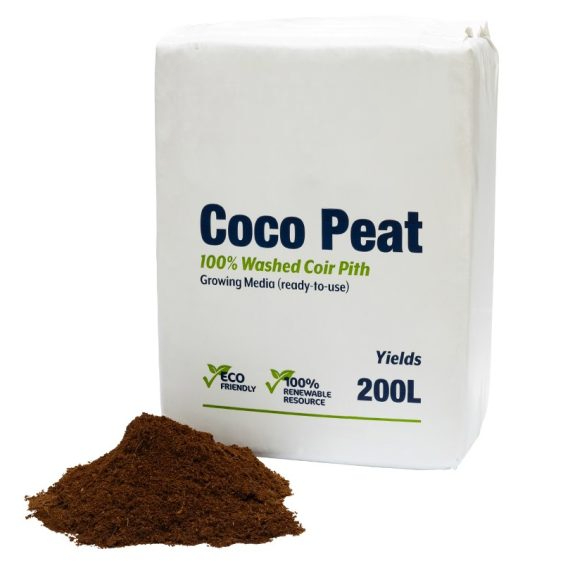Description
COCOPEAT 25 KG BALE
These 25 kg bales are 2:1 compressed coco peat which expand to 180 to 200 lts. These bales are easily broken for usage due to low compression. Specifically designed for farming, gardening and seed production. These bags serve as exceptional soil conditioners, offering a wide range of advantages for plant growth and development. Usually these bales are compressed with about 40% moisture which is ready to use in gardens.
1. What is a 25kg Coir Pith Bale?
- Definition: A 25kg coir pith bale is a tightly compressed block of dried coir pith that expands when hydrated. It is commonly used in large-scale gardening, farming, or as a base material for potting mixes.
- Purpose: Coir pith bales serve as a soil substitute, soil conditioner, or substrate for various plant types, including vegetables, flowers, and even in hydroponic systems.
2. Composition and Characteristics
- Coconut Coir Pith (Cocopeat): The material is derived from the inner husk of coconuts, processed and dried to create a fine, spongy texture that retains moisture and nutrients.
- pH Level: Typically between 5–6.5, which is ideal for most plants. The pH is often neutral or slightly acidic, suitable for a wide range of crops.
- Water Holding Capacity: Coir pith can absorb and hold up to 8–10 times its weight in water, making it an excellent medium for moisture retention.
- EC (Electrical Conductivity): The bale can be either low EC(ideal for sensitive plants) or buffered EC (processed to remove excess salts) to suit different applications.
- Fiber Content: The coir pith inside the bale is finely processed, with minimal coarse fibers, providing a soft texture for root development.
3. Physical Specifications
- Weight: The bale weighs 25 kgwhen compressed, making it easy to handle, transport, and store before use.
- Size: A typical 25kg bale measures about 40-50 cm in length, 30 cm in width, and 25-30 cm in height(sizes may vary depending on compression).
- Compression: The material is highly compressed for storage and transport, expanding significantly when hydrated.
4. Advantages of 25kg Coir Pith Bales
- Water Retention: Coir pith retains moisture for long periods, reducing the frequency of watering and helping to maintain consistent moisture levels for plants.
- Aeration and Drainage: The structure of coir pith promotes excellent aeration, allowing plant roots to breathe and preventing waterlogging.
- Sustainable and Eco-Friendly: Coir pith is a renewable resource made from coconut husks, which are otherwise a waste product. It’s biodegradable and an environmentally friendly alternative to peat moss.
- Improves Soil Structure: When mixed with soil, coir pith improves the structure by preventing compaction, increasing drainage, and enhancing nutrient retention.
- Lightweight: Once hydrated, coir pith becomes light and fluffy, making it easier to handle compared to heavier soil amendments.
5. Applications of 25kg Coir Pith Bales
- Soil Conditioning: Ideal for amending soil in gardens and fields, as it improves moisture retention, drainage, and overall soil structure.
- Hydroponic Systems: Used as a growing medium for hydroponic crops due to its excellent water-holding capacity and aeration.
- Container Gardening: Coir pith is perfect for use in containers and pots, as it helps retain moisture and provides a good environment for root growth.
- Seed Starting and Propagation: Coir pith provides an excellent, clean medium for starting seeds or rooting cuttings due to its fine texture and moisture retention.
- Greenhouse and Nursery Growing: Ideal for use in commercial and home greenhouses, particularly for crops that require a stable moisture supply and healthy root systems.
- Potting Mixes: Can be used as a base component in potting soil mixes, often combined with other materials like perlite, vermiculite, or compost.
6. How to Use a 25kg Coir Pith Bale
- Hydrate: Place the compressed bale in a large container or on a surface where it can expand. Add water gradually to allow it to rehydrate and expand, typically yielding 150-250 liters of hydrated coir pith.
- Loosen the Material: After hydration, break apart the expanded coir pith with your hands or a tool. It will become soft and easy to mix with other growing mediums.
- Mix with Soil or Other Media: You can mix coir pith with other materials like perlite, sand, compost, or soil to create the ideal growing medium for specific plants.
- Planting: After preparing the coir pith, you can directly plant seeds or seedlings into it, or use it as a top dressing for existing plants to improve the soil’s water-holding capacity.
7. Customization Options
- Buffered Coir Pith: Some bales come in a buffered form, where the salt content is reduced, making it safer for sensitive plants and hydroponic systems.
- Low EC Coir Pith: Available for applications that require a low salinity environment, particularly in sensitive crops or hydroponics.
- Coarse or Fine Coir Pith: Coir pith can be finely or coarsely processed to suit different horticultural needs.
8. Environmental Benefits
- Sustainable: Coir pith is a natural, renewable resource made from coconut husks, which would otherwise be discarded. Its use helps reduce the reliance on peat moss, which is harvested from non-renewable bogs.
- Biodegradable: Coir pith is biodegradable, breaking down over time and enriching the soil when used as an amendment.
- Carbon Sequestration: As an organic material, coir pith contributes to carbon sequestration in soils, helping mitigate climate change.
9. Storage and Shelf Life
- Storage: Coir pith should be stored in a dry place before use to prevent any potential mold growth or degradation. Keep it away from moisture and high humidity.
- Shelf Life: If kept in dry conditions, coir pith can be stored for long periods (up to 1-2 years) without significant degradation.
10. Disposal and Eco-Friendly Considerations
- After use, coir pith is biodegradable and can be composted or mixed into the soil as an organic matter amendment. It can also be recycled into other products.
25kg Coir Pith Bales provide a convenient and cost-effective way to manage large quantities of cocopeat for gardening, farming, or hydroponics. They offer excellent water retention, aeration, and soil improvement properties, making them a versatile and eco-friendly option for both small-scale and commercial growers.
Specifications
| Specification | Description |
| Bale size | 30 x 45 x 65 cm |
| Unit Weight (± 5%) | 23 to 25 kgs |
| Moisture | 35 – 40 % |
| Compression Ratio | 2:1 |
| PH | 5.5 to 6.5 |
| Electro Conductivity | >1.0 ms/cm (High EC block) & < 0.5 ms/cm (Low EC block) |
| Hydrated yield (Litters) | 190 to 200 liters |
| Packing | UV bag with 550 gg thickness Palletized : 560 nos per 40 HC Loose stuffing :
610 nos per 40 HC |
| Min. Order | 1×40 HC |
| Manufacturing Capacity | 8×40 HC per month |







Reviews
There are no reviews yet.